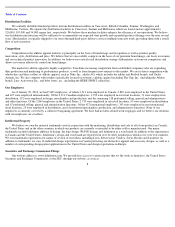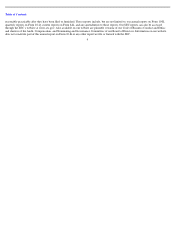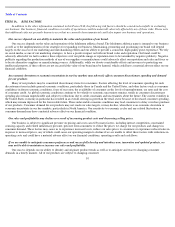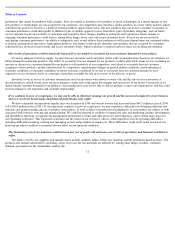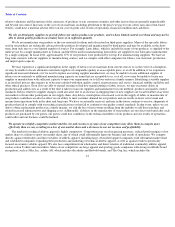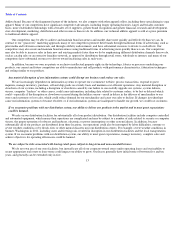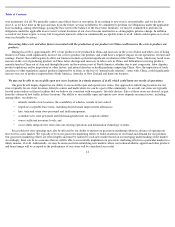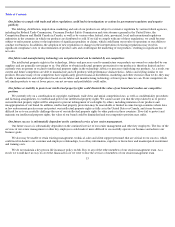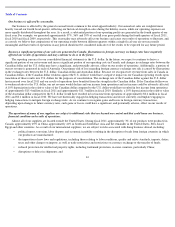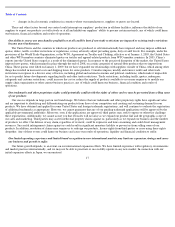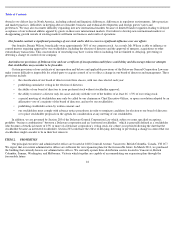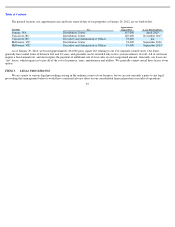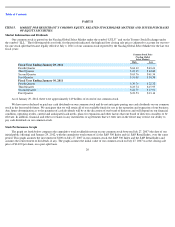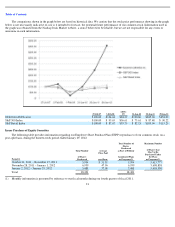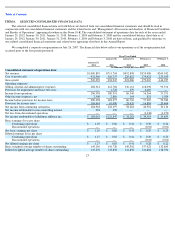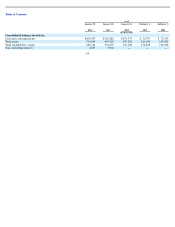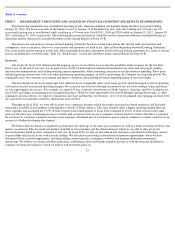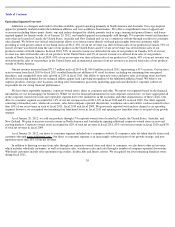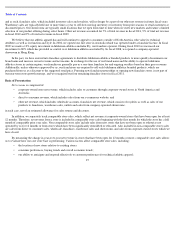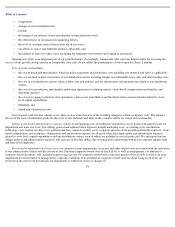Lululemon 2011 Annual Report Download - page 21
Download and view the complete annual report
Please find page 21 of the 2011 Lululemon annual report below. You can navigate through the pages in the report by either clicking on the pages listed below, or by using the keyword search tool below to find specific information within the annual report.
Table of Contents
obstacles we did not face in North America, including cultural and linguistic differences, differences in regulatory environments, labor practices
and market practices, difficulties in keeping abreast of market, business and technical developments and foreign guests’ tastes and
preferences. We may also encounter difficulty expanding into new international markets because of limited brand recognition leading to delayed
acceptance of our technical athletic apparel by guests in these new international markets. Our failure to develop new international markets or
disappointing growth outside of existing markets will harm our business and results of operations.
Our founder controls a significant percentage of our stock and is able to exercise significant influence over our affairs.
Our founder, Dennis Wilson, beneficially owns approximately 30% of our common stock. As a result, Mr. Wilson is able to influence or
control matters requiring approval by our stockholders, including the election of directors and the approval of mergers, acquisitions or other
extraordinary transactions. This concentration of ownership may have various effects including, but not limited to, delaying, preventing or
deterring a change of control of our company.
Anti-takeover provisions of Delaware law and our certificate of incorporation and bylaws could delay and discourage takeover attempts
that stockholders may consider to be favorable.
Certain provisions of our certificate of incorporation and bylaws and applicable provisions of the Delaware General Corporation Law may
make it more difficult or impossible for a third-party to acquire control of us or effect a change in our board of directors and management. These
provisions include:
In addition, we are governed by Section 203 of the Delaware General Corporation Law which, subject to some specified exceptions,
prohibits “business combinations” between a Delaware corporation and an “interested stockholder,” which is generally defined as a stockholder
who becomes a beneficial owner of 15% or more of a Delaware corporation’s voting stock, for a three-year period following the date that the
stockholder became an interested stockholder. Section 203 could have the effect of delaying, deferring or preventing a change in control that our
stockholders might consider to be in their best interests.
Our principal executive and administrative offices are located at 1818 Cornwall Avenue, Vancouver, British Columbia, Canada, V6J 1C7.
We expect that our current administrative offices are sufficient for our expansion plans for the foreseeable future. In March 2011, we purchased
the building that currently houses our administrative offices. We currently operate three distribution centers located in Vancouver, British
Columbia, Sumner, Washington, and Melbourne, Victoria which together are capable of accommodating our expansion plans through the
foreseeable future.
18
•
the classification of our board of directors into three classes, with one class elected each year;
•
prohibiting cumulative voting in the election of directors;
•
the ability of our board of directors to issue preferred stock without stockholder approval;
•
the ability to remove a director only for cause and only with the vote of the holders of at least 66
/3% of our voting stock;
•
a special meeting of stockholders may only be called by our chairman or Chief Executive Officer, or upon a resolution adopted by an
affirmative vote of a majority of the board of directors, and not by our stockholders;
•
prohibiting stockholder action by written consent; and
•
our stockholders must comply with advance notice procedures in order to nominate candidates for election to our board of directors
or to place stockholder proposals on the agenda for consideration at any meeting of our stockholders.
ITEM 2.
PROPERTIES
2


